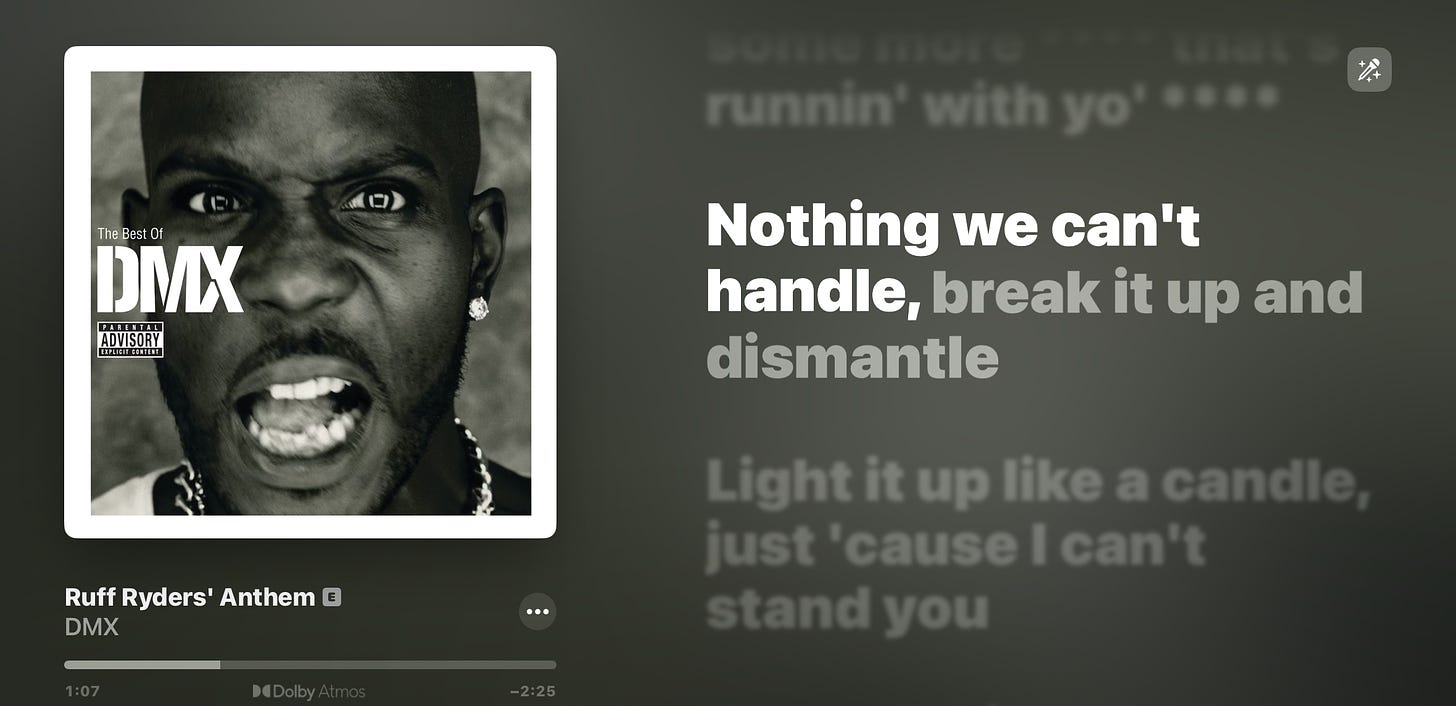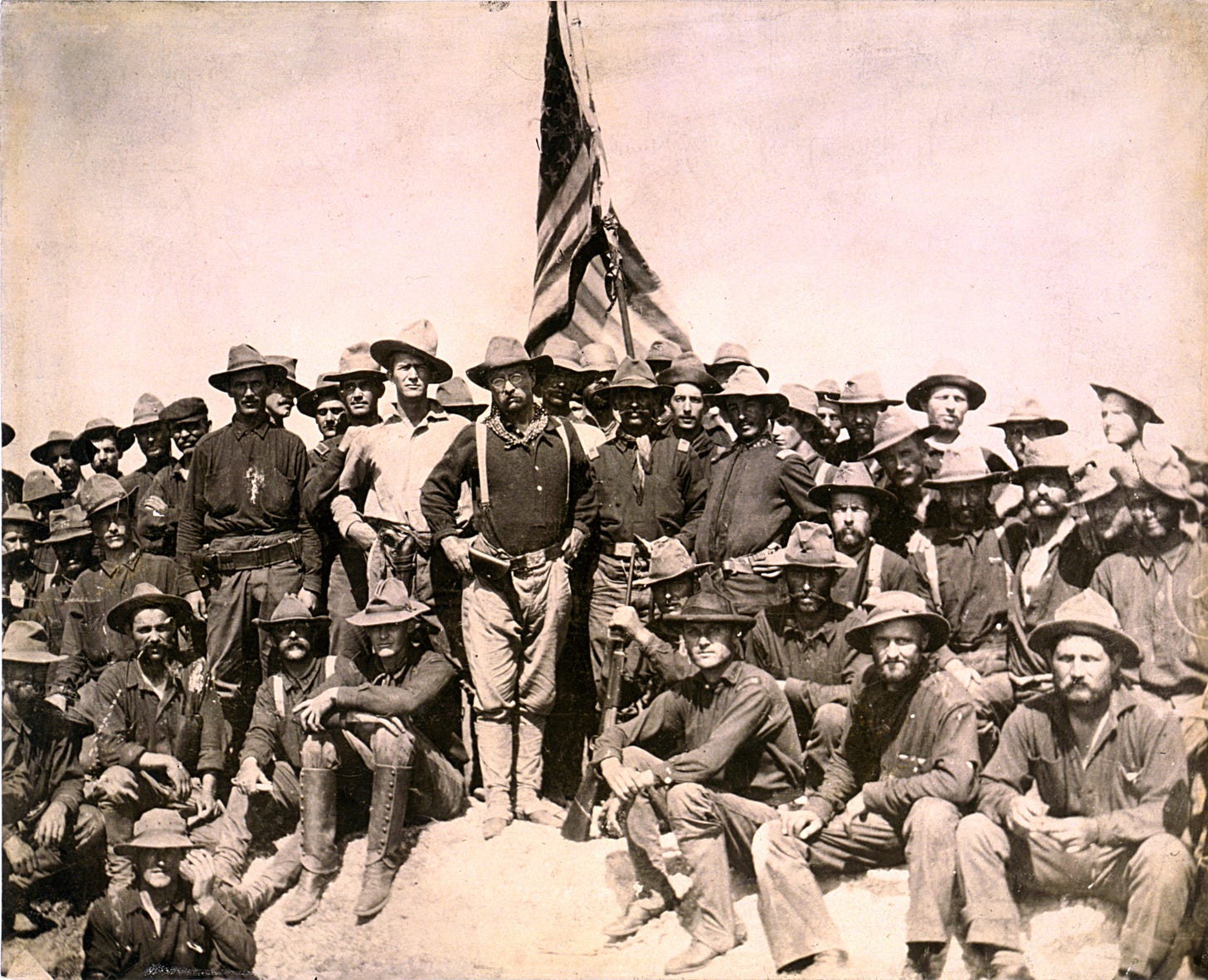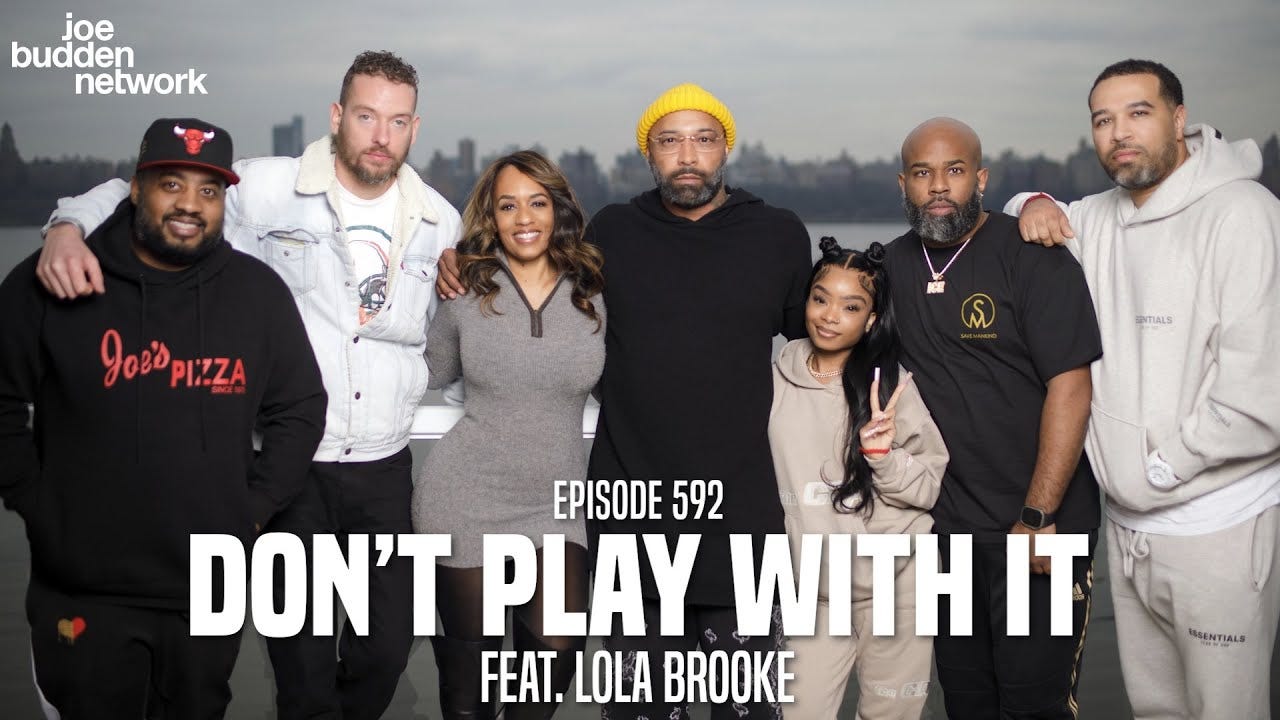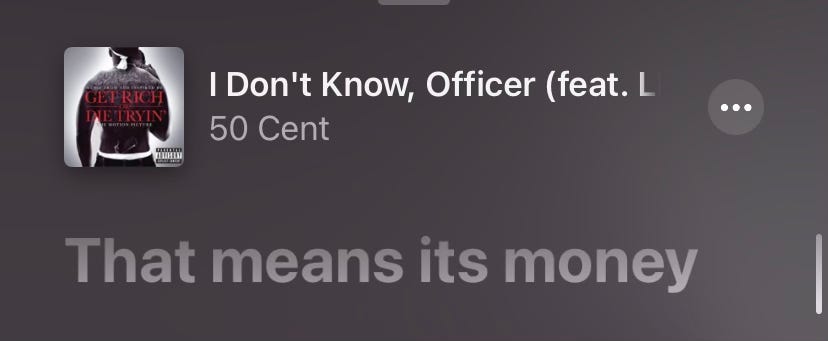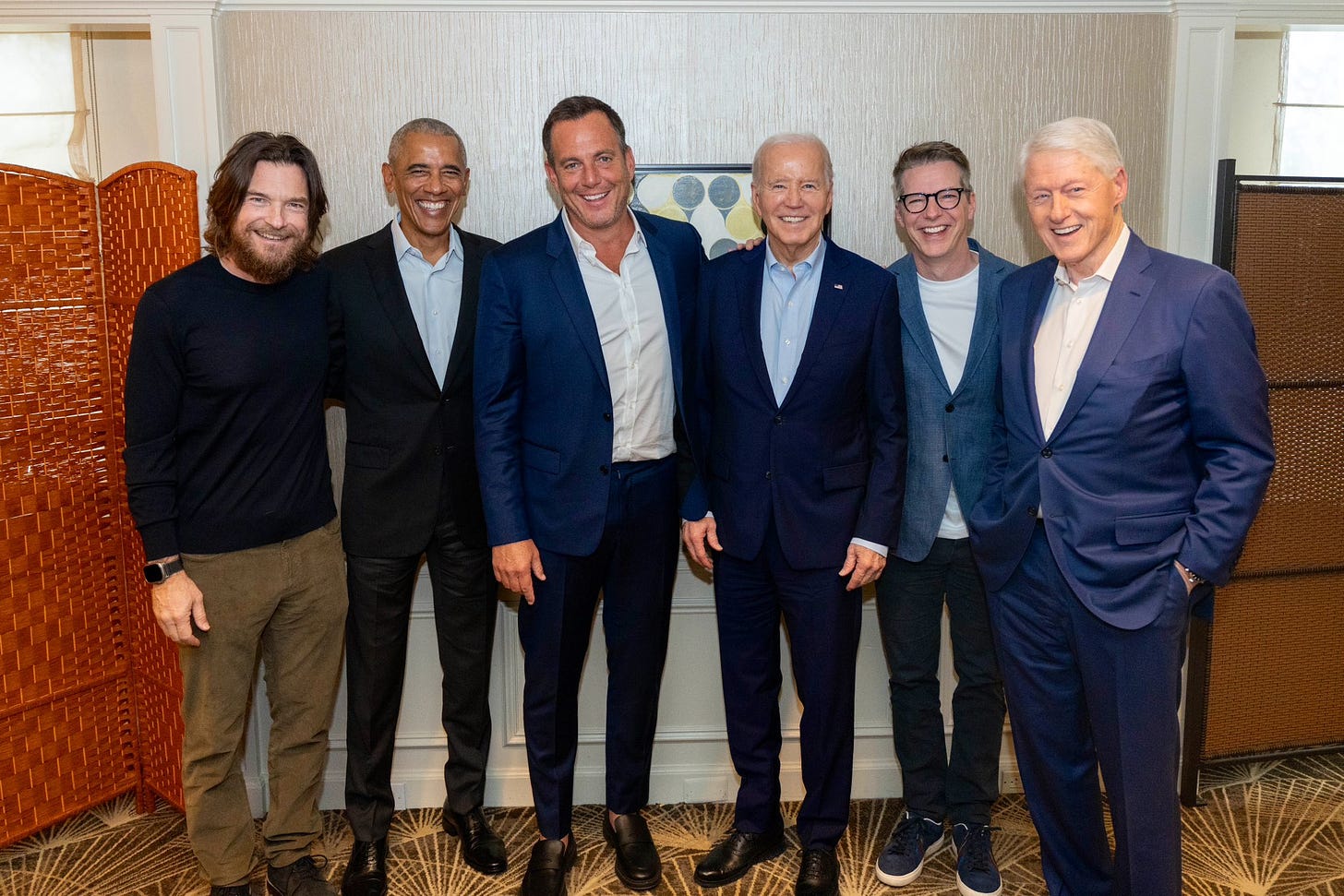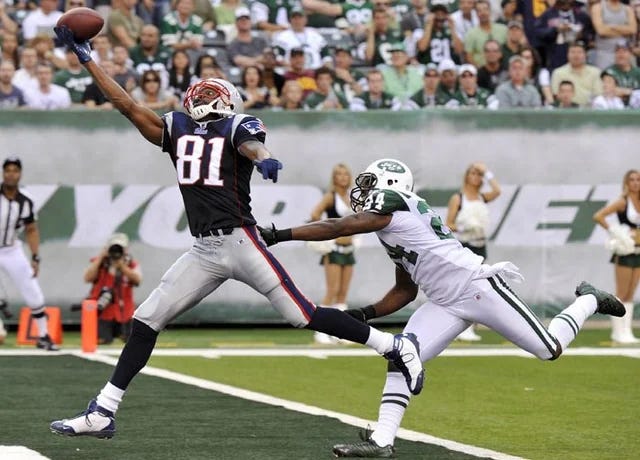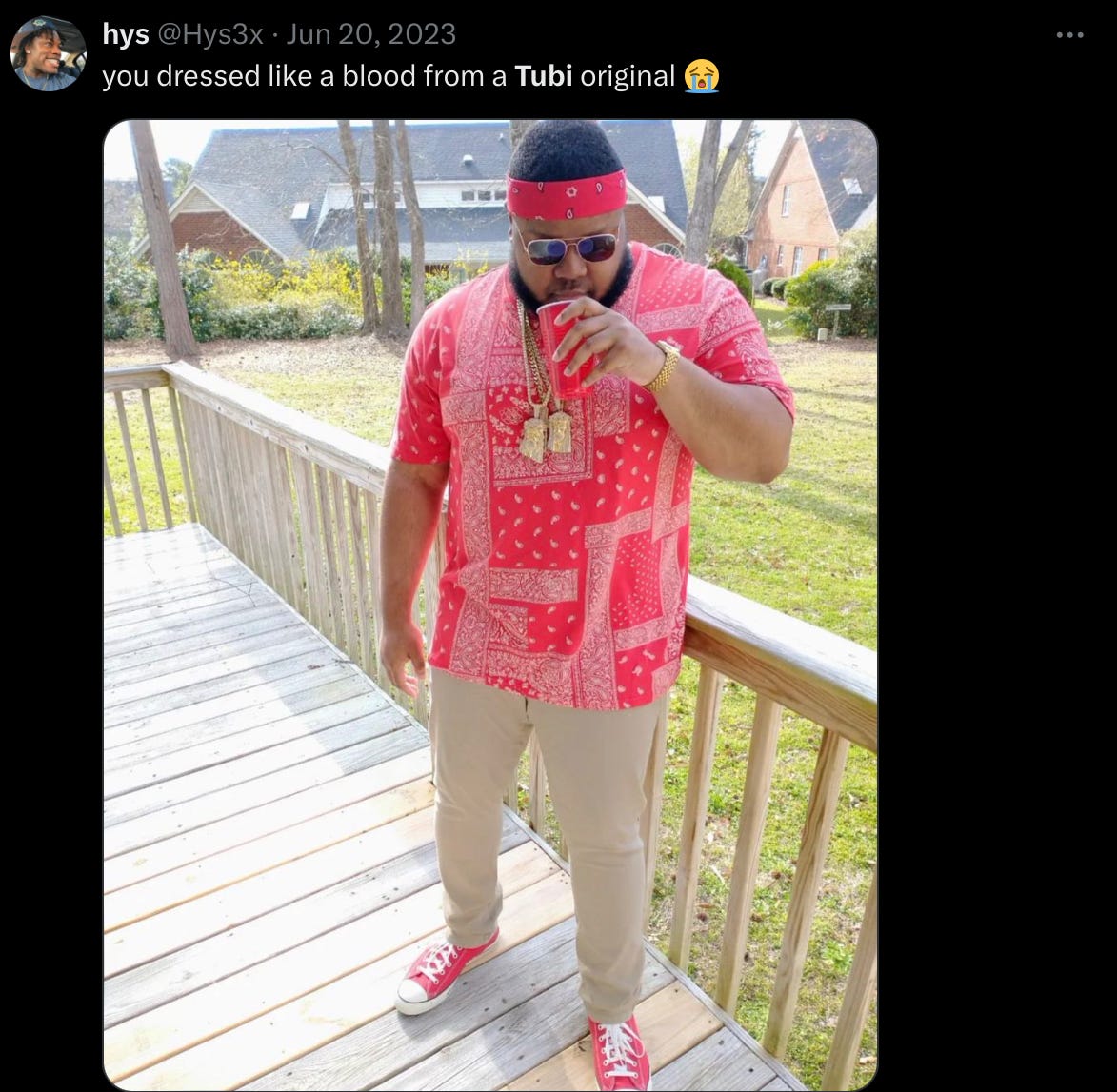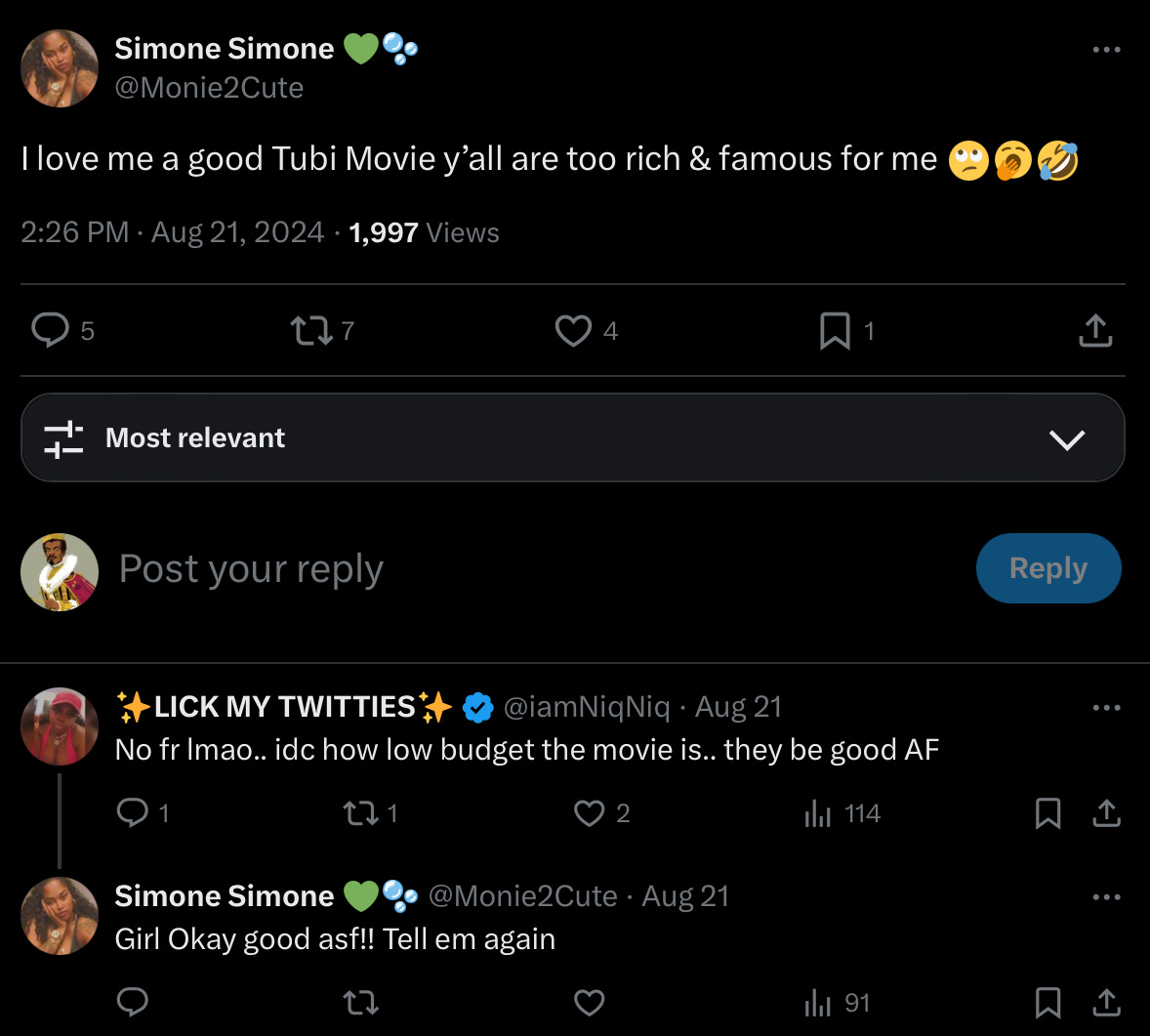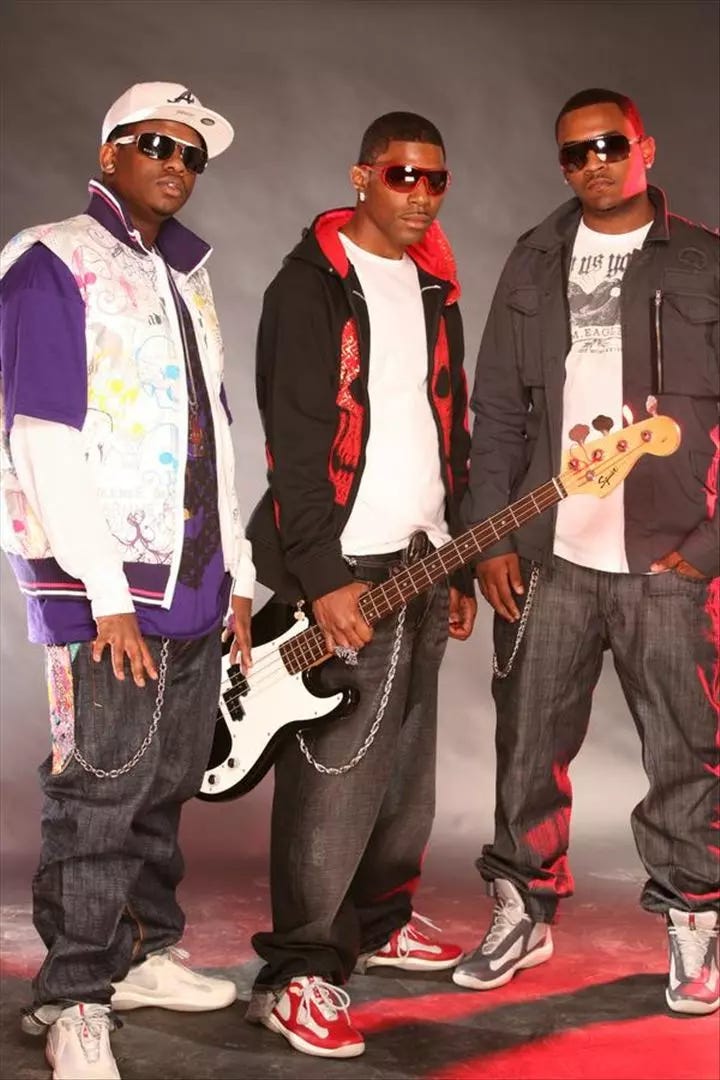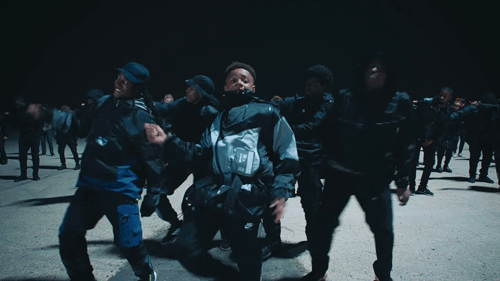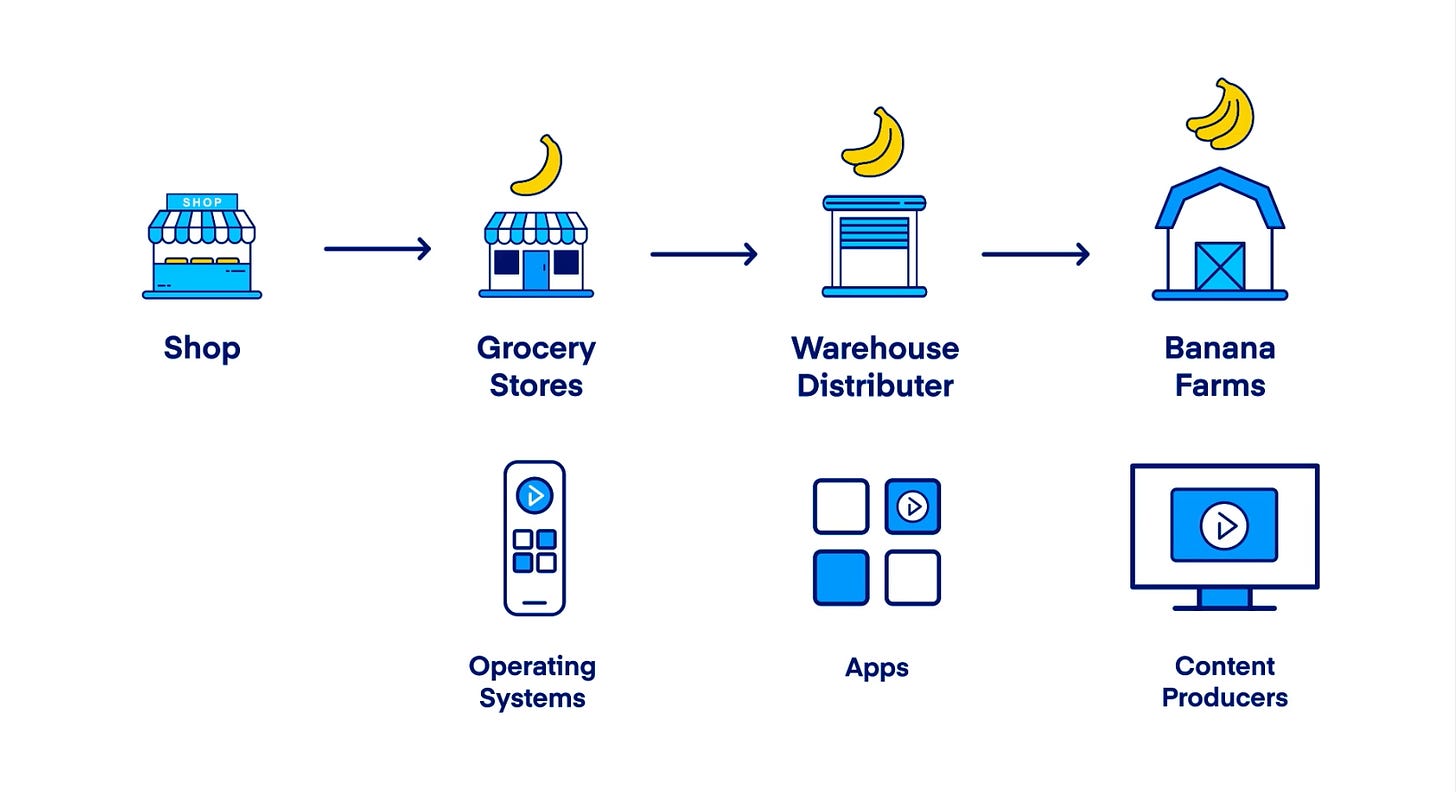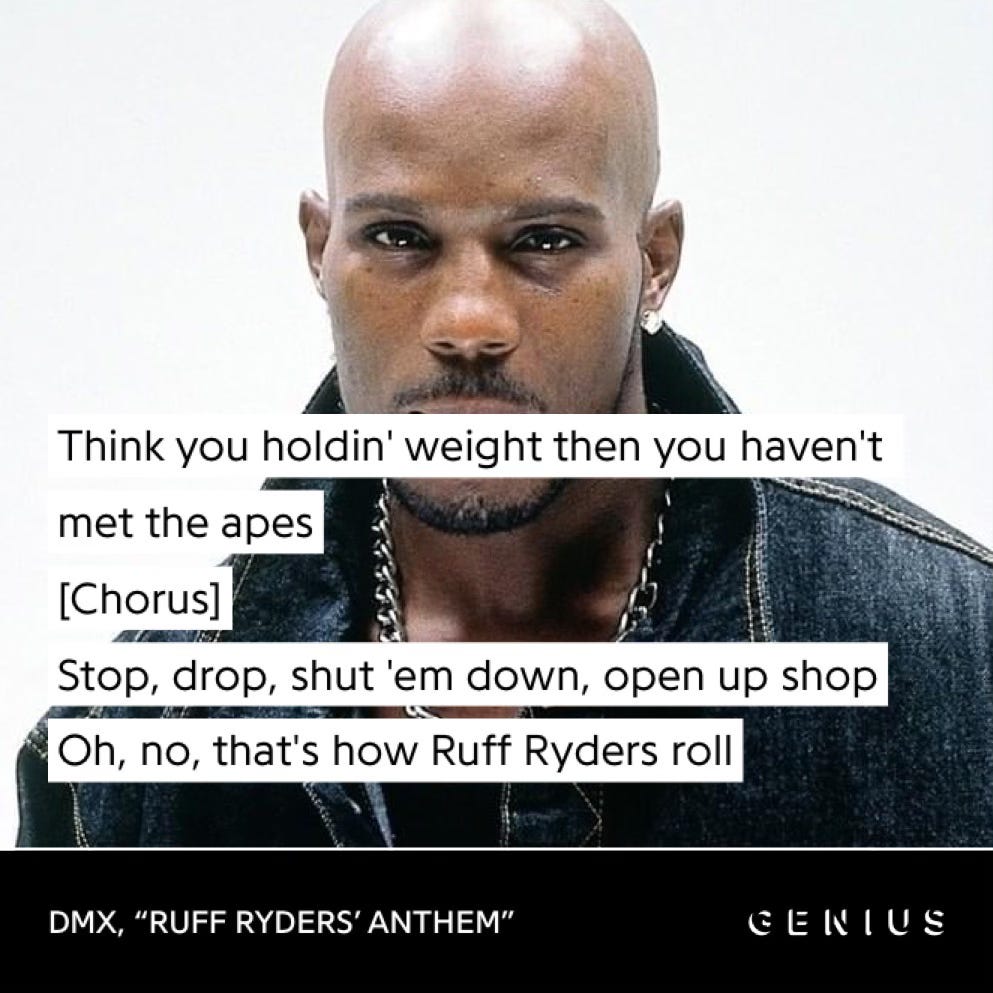Surveillance advertising has never existed outside of politics. On the contrary, like every other communication system in existence, the internet’s prevailing economy structure has been heavily shaped by public policy.
Matthew Crain, ‘Profit over Privacy: How Surveillance Advertising Conquered the Internet’
Funny story, I once met DMX in person. He was taller than I thought, or maybe I’m just short.. anyway, I was on a date with this girl I was crazy about (that’s another story); and as we were walking out, he was in the doorway of the restaurant. We struck up a brief conversation and my biggest takeaway was he was exactly like I thought he would be.
“Get at me dawg!”
He was just like that.. which was a nice surprise, because it’s not always like that. Many people in the media and entertainment business turn out to be weirdos (🤨) but X was real and down to earth.
As he once said: “I’m not an industry artist, I’m an artist in the industry”.
I dig it, now, let’s get into it.
POLITICS
This is Part 2 of a series on digital media; and, in this article, we’ll be looking at the connection between politics and media, and how this creates a platform for creators in the media business.
Brace yourself, this is a long one.
As I’ve said before, the word “media” has its etymological roots in the meaning of an “intermediary, agency, or one who communicates a message”. Anywhere you hear the term “media”, you should think of someone communicating a message on behalf of someone. Sometimes the “someone” is a corporate partner, and sometimes it’s a state / government actor and/or benefactor; but every message is always communicated on behalf of someone.
This is where politics comes in.
The etymological meaning of the word “politics” means.. "of citizens, pertaining to public affairs, pertaining to the state and its administration; pertaining to public life."
In other words, anything that has to do with the public life of citizens involves politics.
When we discuss the public life and activities of people, we are discussing government. Traditional government is simply the assignment of social governance to a few.. for instance, what people often call democracy is not really democracy, it’s more of a democratic republic, where a few are elected to make decisions for the many.
In ‘Another Story’ M.anifest and Burna Boy speak about the export of so-called democracy, by the British, which was really to facilitate a business transaction; and if you dig into the history of companies like the ‘East India Company’, you’ll see that there is a close connection between commerce and what we normally call “politics”. At its root, it comes down to the governance and administration of people and resources; all of which have the potential to yield economic results.
In terms of media and politics, many books, papers and articles have been written about the relation between media and politics; but a great example of this is Teddy Roosevelt, leader of the rough riders (not the Ruff Ryders), the 26th President of the United States. The Rough Riders were a calvary raised to fight in the Spanish-American War; but this isn’t about that. Teddy Roosevelt was famous for coining the term “bully pulpit”; which essentially meant “a terrific platform from which to advocate an agenda”. In other words, he realized his position and prominence, not only as President, but from the public arena which provided him a platform through which he could advance ideas and agendas.
That term has been popularized and used today; there’s even a political advertising agency named after it.
The term “bully pulpit” has come to signify a platform from which any individual is able to influence the masses; and is most notably correlated with media platforms.
I won’t spend too much time here, frankly because I think that it’s common sense that political and public figures utilize media platforms to advance their agendas, depending on the audiences and demographics of those platforms.
One thing that is clear, however, is that media platforms provide a significant opportunity for public figures to influence the public; most notably, traditional politicians. Because, when we look at it, do most presidents have the skill set to lead an army, balance federal budgets, advise on agricultural matters and economies, and provide stock market insights; or are they largely charismatic figureheads, with narrow/specific expertise, who surround themselves with capable people who advise them on ancillary matters while they present a comforting front for the country and their diplomatic counterparts?
If not, then this is why media influence is key.
But politicians utilizing media is not new, what’s new is the money and influence involved in new media due to the reach and scale of the internet and digital platforms. Kamala Harris’ $370 million digital and television ad push, for example. The point is, having a voice is powerful, and social influence naturally leads to political capital (as does financial capital). This is why politicians not only appear on media platforms, and utilize media; but also why they frequently tap artists and celebrities for endorsements.
These advertisements and endorsements are not only because of “clout”, but are strategically executed to target individuals based on their demographics, psychographics, and other personal data collected across the web and through various data collection methods. Additionally, strategic and advertising agencies collect personal data and advise political candidates on how to position themselves, brand themselves and create content and speaking points that are targeted at individuals in order to influence.
The point is.. media is influence. So let’s talk about some of the social influence we see in media today.
PODCASTS
Through the evolution of the internet, we’ve seen the “bully pulpit” extend from traditional forms of media, to digital media; including podcasts and internet platforms. During the last election Joe Biden was on the Breakfast Club, where he notoriously proclaimed:
You ain’t black if you vote for Trump!
Joe Biden’s declaration was, implicitly, that he knew what was best for black people; and that black people are monolithic and should abandon their agency in exchange for his and the Democratic Party’s regime and directives. It was essentially a media advertising exercise for the President to declare the Democratic Party as the party for black people.
Now whether or not someone decides to vote Republican or Democrat doesn’t really matter to me. The point is that media and politics are intertwined, and always connote an element of marketing and advertising.
As a side note, this may be one of the reasons why, in the Bible, we see God tell the Israelites not to elect a king.
Samuel was displeased with their request and went to the Lord for guidance. Do everything they say to you, the Lord replied, for they are rejecting me, not you. They don’t want me to be their king any longer. Ever since I brought them from Egypt they have continually abandoned me and followed other gods. And now they are giving you the same treatment.
Do as they ask, but solemnly warn them about the way a king will reign over them.
So Samuel passed on the Lord’s warning to the people who were asking him for a king. This is how a king will reign over you, Samuel said. The king will draft your sons and assign them to his chariots and his charioteers, making them run before his chariots. Some will be generals and captains in his army, some will be forced to plow in his fields and harvest his crops, and some will make his weapons and chariot equipment.
The king will take your daughters from you and force them to cook and bake and make perfumes for him. He will take away the best of your fields and vineyards and olive groves and give them to his own officials. He will take a tenth of your grain and your grape harvest and distribute it among his officers and attendants. He will take your male and female slaves and demand the finest of your cattle and donkeys for his own use.
He will demand a tenth of your flocks, and you will be his slaves. When that day comes, you will beg for relief from this king you are demanding, but then the Lord will not help you.
But the people refused to listen to Samuel’s warning. Even so, we still want a king, they said. We want to be like the nations around us. Our king will judge us and lead us into battle. So Samuel repeated to the Lord what the people had said, and the Lord replied, Do as they say, and give them a king.
Then Samuel agreed and sent the people home.
1 Samuel 8
Theres a lot to unpack from that passage, but the point I want to make here is we all should (IMO) strive to a degree of agency in our lives where we self determine who we want to be and what we want to see; yet, while realizing the greater ecosystem in which we live.
Which leads me to another point; that is - people watch podcasts, sports, and media and entertainment programming because they: aspire, to a degree, to be the person they’re watching; admire what they stand for; or are inspired by their craft and/or success.
Essentially, there is something about what that public figure does that speaks to you - for better, or worse. You like their ideas, their music, their actions.. their agency. And their agency triggers or sparks something within you; similar to a politician calling for “change”.
That’s political. That’s influence.
Yep.
So let’s look at some areas where that money flows.
Players
What’s amazing to me is the dollars that social influencers are able to command in today’s digital media age. As an attorney, I frequently review ‘Influencer Agreements’ and routinely see high five figure, and even six figure deals, for just a couple branded social media posts. When we look at other spaces, these numbers are even more extraordinary. For example:
Kelce Brothers deal with Amazon’s Wondery worth more than $100 million;
‘Call Her Daddy’ Host Alex Cooper’s deal with Inks SiriusXM worth up to $125 million; and
Jason Bateman, Will Arnett and Sean Hayes’ ‘SmartLess’ podcast deal, with SirusXM for $100 million.
Of course, deals like this are often the product of public figures who already have established audiences and parachute in to create podcasts as brand extensions. We’ve also seen other high-profile figures such as Angel Reese and Draymond Green start their own podcasts; but this is key and is the opportunity for those with established and/or burgeoning brands who have an engaged audience, and are looking for ancillary revenue streams.
🪂
While there’s opportunity for everyone, the opportunity is generally more pronounced or easily accessible for those with sizable and pre-existing audiences. As I’ve written before, this is related to the “power law”; or more commonly known as “the rich get richer”.
Additionally, the money behind these deals is predicated not only on the distribution of these podcasts and underlying media content and IP; but also the ad sales, sponsorships, and ancillary revenue streams that can be attached to the audiences. This speaks to the underlying infrastructure such as podcast networks. Podcast networks are essentially management companies for podcasts which help with various things such as ad sales. I’ll get into that later; but for people without these audiences, my two cents are that the podcasts I generally see thrive are podcasts that have the following factors:
Genuine Interest. The podcast doesn’t feel forced, it feels like you’re listening to friends speak about something they care and/or know a lot about.
Credibility and Experience. One of the most enjoyable things is listening to people who do a thing for a living, but can joke and have fun while talking about it. “If you can’t explain it to a 5th grader, you don’t understand it”.
Charisma. It’s enjoyable listening to people who are able to engage with guests and/or capture the attention of listeners. Again, it’s like Presidents. The most qualified and smartest person usually doesn’t become President (no offense); it’s the one who is able to garner social (and political) capital and galvanize a population.
It’s a long term play. If you’re going to do it, do it because you’re excited about the topic or theme and have genuine passion for the underlying conversations.
POSITIONING
One of the most difficult things in monetizing your craft is developing and establishing your position. It’s something I’ll continue to dig into; but, when it comes to the digital media space, positioning is important. In order to position, you have to know the players in the field or sector so you can best know where you fit.
I think for me, it’s an area where I’ve struggled. I have a nonprofit community background, I’m a commercial attorney, but I can also A&R an album, I can come up with a marketing strategy. I could also preach a sermon; etc. I’m not saying that to “big myself up”, I’m saying it because it can be a problem. When you can do different things it can cause personal stress and confusion. It can also create stagnancy because you have all of these ideas, but it can be challenging to take action when you see different opportunities. On top of that, we live in a world where people often want to put you in a box; and institutions and others want to fix you in place so they can execute their own strategies, then when you break the mold (or matrix) it often makes people nervous, creates cognitive dissonance in their minds, and they don’t know how to handle you.
…but you handle dogs, you don’t handle people.
Players
That all reiterates the importance of understanding the landscape when playing your own game.. because you’re going to have to play one game or the other, so why not your own? When looking at the media landscape, it’s no different.
In the media business, we see customer facing properties; but you also have behind the scenes players. I really wanted to go into detail here, but this article is already getting too long so here are a few players that I will cover later. References are courtesy of Dominik Kosorin’s ‘Data in Digital Advertising’:
Publishers;
Advertisers;
FAST Channels;
SVOD and AVOD Platforms;
Agencies and Agency Trading Desks;
DSPs; and
Ad Measurement Vendors
I’ll go into some of these later; but, for now, let’s look at one specific player.
Tubi Time
If you’re not familiar with Tubi, it’s what’s known as a FAST Channel; which stands for ‘Free Ad-supported Streaming TV’. It’s gotten a lot of press lately, both commercially and socially.
Socially, people often view FAST Channels as being lower budget and not as prestige as platforms such as Netflix (which also utilize ad-supported business models btw). I think much of it is due to (i) not respecting something unless it’s aligned with a certain platform or aesthetic, (ii) hate and self hate, (iii) not understanding the media business and how hard it it is, but also (iv) some funny takes.
Other than that, FAST Channels like Tubi, Roku, Amazon Freevee, and Pluto TV are making serious commercial noise. Here are a few stats:
“In 2020, FAST content was 6% of the total content consumed. In 2022, that number rose to 33%”
“FAST services are increasingly gaining popularity as a solution to subscription fatigue, which refers to the exasperation felt by viewers as they accumulate expenses from multiple OTT (over-the-top) platforms”
In terms of Tubi, it’s a platform which is owned by Fox and produces its own content; in addition to licensing older and independent content. Fox bought Tubi for $440 million in 2020, which was driven by the corporation’s effort “to move into streaming”.
As reported by AV club, its ”audience numbers surpass many of the major streamers (Peacock, Apple TV+, etc.), are tied with Disney+, and fall behind only Netflix, Amazon, and Hulu (the three streamers that have been around the longest”
“Tubi benefits from having a deep and extensive library of 250,000 shows and movies”; and
“An analyst estimated for The New York Times that Tubi generated $900 million in revenue over the last year, compared to an estimated $775 million the year before”.
The success of Tubi is an outgrowth of the evolution we’re seeing in digital media, largely born out of digital enablement and advertising. Additionally, its ad-supported business model is creating somewhat of an opportunity.
According to The NY Times, “Tubi has also established a particularly strong following among Black viewers. In June, 46 percent of Tubi’s audience was Black, far more than its competitors, according to Nielsen. It is the only major streaming service that has a greater share of Black viewers than white viewers. (The average share of Black viewers for all streaming services in the United States is 20 percent).”
Additionally, Tubi has partnered with black creators such as Khaby Lame and Issa Rae in order to create opportunity where there may otherwise have been minimal opportunities.
This is an additional testament to the ad-supported business model in the digital media business. The point here is that this is another example of the opportunity that exists in the digital media business which allows creators to leverage and monetize their audiences; and points to the importance of understanding the media business that creators find themselves in today.
Shop Boyz
When I was a freshman in college, the ‘Shop Boyz’ released a song called ‘Party Like a Rockstar’. It reached “number two on the US Billboard Hot 100 (the #1 song on the Hot 100 at the time being Rihanna's "Umbrella") and became the highest-selling ringtone of 2007”. They were part of a wave that signified the resurgence of Atlanta’s dominance of rap music.
It was a moment..
If anything, I would say that the long term issue with the group was in their branding and story telling. The masses knew their song; but didn’t necessarily know their brand, their story, who they were.. and, even though Lil Wayne hopped on a remix, that deficiency led to the lack of extension of their media business’ lifecycle.
That’s a metaphor.
As a creator, in media, you’ve essentially decided to set up shop (like the Shop Boyz), now the question is what are you selling and how do you fit into the larger media ecosystem?
As I mentioned in Part 1, many look at advertising, sales, and media as negative things; some even say advertising supported content leads to bad incentives.. but what’s the difference between ad supported content and D2C content put up for sale and created simply because there’s a market? Isn’t that what we saw in the music industry where teenage and young twenty-something year old women “were” incentivized to overly sexualize themselves before they even understood themselves or the world? Or where young black men “were” incentivized to create drug and violence infused music because that’s the image that much of the world has of young black men and black people in general.
Ads aren’t the problem; even money isn’t the problem. Most people misquote the verse - it’s not money that’s the root of all evil, it’s the love of money.
As it relates to advertising and the music business, for instance, ad supported streaming came after those bad incentives; not before. It’s not the format that’s indicative of the goodness of a thing (or lack thereof).. it’s the function of the thing; the underlying purpose behind why it’s been created and what it’s meant to achieve.. as the scripture says, satan doesn’t come with horns but as an angel of light.
Or to quote Lupe, form follows function. If the function isn’t right, the format doesn’t matter, it will always be used for perverse aims by some. You can’t, transformatively regulate human nature, that’s called prison.. and, even there, you still see crime. Human nature is, ultimately, self-determined; and true morality cannot be hoisted upon us by (also flawed) human governors.
Alright, I’m getting esoteric.. let’s bring it back.
Planet of the Apes 🦍🌍
Following up on my notes from my course at The Trade Desk, they essentially compared a sector of the digital media advertising supply chain to a series of shops; specifically, banana producers and retailers; here’s a graphic which explains it:
The thinking is that each of these parties produces a monetizable good and/or service, in this case bananas; but really data. For example..
Content producers (creators) are essentially farms, they are the closest to the resource (people and data derived from people - aka personal data). That personal data is a continually renewing resource. In essence, operating systems and apps need content creators more than creators need them… technological platforms, systems, and apps are distribution mechanisms (and are beneficial); but an artist can stand outside and make money from performing, a platform can’t make money without creators.
I said no to the Super Bowl.
You need me, I don’t need you.
Jay Z
You dig?
So how is all of this applicable for creators? Well, if I’m being honest, I believe most people should not be trying to be a “creator” as their main source of income. I believe we’re all creators and artists, as I’ve previously said; but that doesn’t mean being a singer, writer, rapper, painter, or podcaster as your primary source of income is the right path for you. It might sound harsh, but if I said not everyone should be an NBA player.. you wouldn’t have an issue because you realize that playing in the NBA takes a heightened level of discipline, ability, talent, and good fortune. It’s really no different here. Anyone can play basketball just like anyone can make music, paint or write.. but not everyone is meant for the pros. That’s life.
How do you know what’s for you? Well, for starters, would you still do it if there was no money in it, would you have the same dedication and love? Would you be willing to do it for ten years knowing you wouldn’t get paid?
In my case, advising artists and creators is something I would do for free and have done for free.. helping to invest in, and build, community (particularly those who are underserved) is something I do and have done for free.
Theres a difference.
So it starts with knowing yourself, understanding who you are;
Then truly understand the value of influence and impact that you will have when operating in your purpose;
After that, determine what you do and produce;
Then determine your target audience, sometimes it’s who you thought.. other times, it’s not who you thought.. but keep producing; and collect and analyze the data. The data will then provide you with insights that can be acted upon, whether it’s for you to continue your service, or to partner with brands and other third parties to serve your audience(s);
Finally, understand the playing field, know your position, and develop a strategy to execute.
See you in Part 3.




